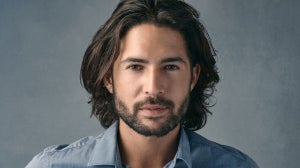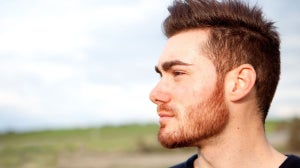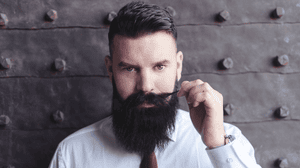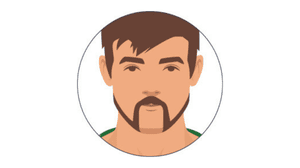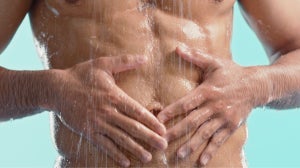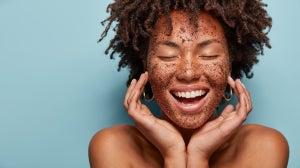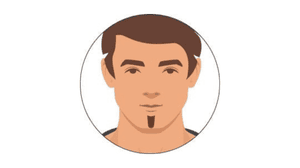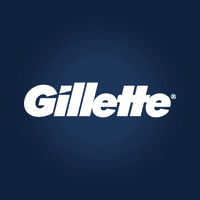
Shaving and trimming your chest hair can help you achieve a well-groomed and confident look. Whether you prefer a smooth and clean-shaven chest or a neatly trimmed appearance, Gillette is here to provide you with the ultimate guide. In this comprehensive article, we'll delve into the step-by-step techniques, product recommendations, grooming tips, chest hair styles, and frequently asked questions to help you achieve the perfect chest hair look.
When Do Men Grow Chest Hair?
So, what age does chest hair grow? Some men begin to grow chest hairs during late puberty, others in their twenties and some don’t even grow chest hair at all. Nature works in weird and wonderful ways, but whether we grow chest hairs or don’t, it’s all about embracing our bodies.
For some, the first sign of chest fuzz is a welcomed sign of masculinity – for others, these new sprouting hairs are met with disdain, especially if you don’t yet know how to groom or trim your chest hair.
Chest hair or no chest hair, the best way to approach body grooming is to decide what will make you most comfortable. For plenty of men, a touch of manscaping is a way to express their personality, while sporting a range of chest hair styles and growth patterns.
Should I Shave My Chest Hair?
The decision to shave your chest hair is a personal one, based on your desired aesthetics and preferences. Shaving can give you a more groomed and on-trend look, boosting your confidence at the gym or the beach. While some men embrace the natural look, others prefer the clean-shaven appearance. We'll explore the reasons why some men choose to shave their chest hair and provide guidance on making the right decision for you.
Shaving Chest Hair:
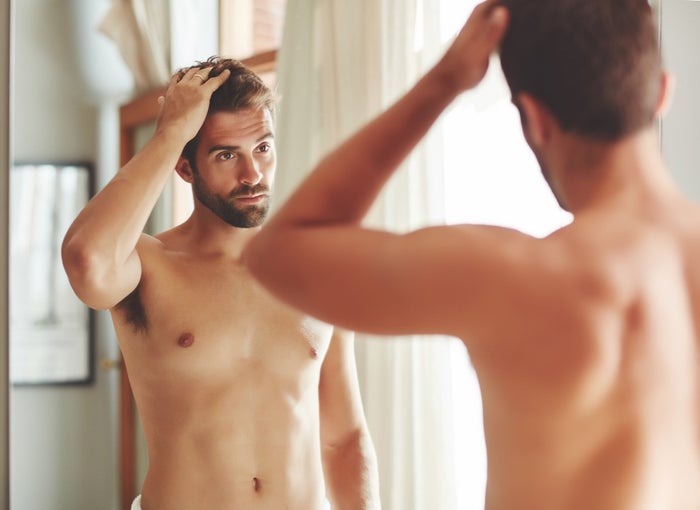
For those who prefer a smooth and clean-shaven chest, follow these steps to achieve the best results:
1. Preparation:
Prepare your chest for shaving by taking a warm shower to soften the hair. Gently exfoliate the chest area to remove dead skin cells and reduce the risk of ingrown hairs. Apply a generous amount of shaving gel or foam to the chest area, allowing it to sit on the skin for a minute or two to further soften the hair.
2. Choosing the Right Razor:
Select a high-quality razor, such as the Gillette Fusion5 Razor or ProGlide Razor, for a close and comfortable shave. Ensure the razor blades are sharp and in good condition to minimize irritation and achieve a smooth result.
3. Shaving Technique:
Start shaving in the direction of hair growth to minimize irritation and ingrown hairs. Hold the razor at a slight angle and use gentle, short strokes. Rinse the razor frequently to remove hair and shaving gel build-up. Take extra care around sensitive areas, such as the nipples, by using light pressure and precise movements.
4. Post-Shave Care:
After shaving, rinse your chest with cool water. Pat your skin dry with a clean towel, avoiding rubbing. Apply a soothing aftershave balm or moisturizer to hydrate and nourish the skin.
Trimming Chest Hair:

Trimming your chest hair is a popular option for achieving a well-groomed appearance without going completely clean-shaven. Follow these steps to trim your chest hair effectively:
1. Preparation:
Before trimming your chest hair, it's essential to prepare the area. Start by taking a warm shower to soften the hair. Dry your chest thoroughly before trimming.
2. Selecting the Right Length:
Choose a trimmer with adjustable comb attachments, such as the Gillette ProGlide Styler. Start with a longer comb attachment, like 4mm, for a neater and natural look. Experiment with different lengths to find the one that suits you best.
3. Trimming Technique:
Hold the trimmer at a 45-degree angle and gently move it against the direction of hair growth. Use smooth and even strokes, working your way across the chest in a systematic manner. Pay attention to the contours of your chest and adjust the angle of the trimmer as needed.
Regularly clean the trimmer's blades to prevent clogging and ensure optimal performance.
Tips for Avoiding Irritation and Ingrown Hairs:
To minimize irritation and prevent ingrown hairs while shaving or trimming chest hair, follow these tips:
Exfoliate regularly to remove dead skin cells and reduce the risk of ingrown hairs.
Use a sharp razor or trimmer with clean and well-maintained blades.
Shave or trim in the direction of hair growth to minimize irritation.
Avoid applying excessive pressure, as it can cause skin irritation and cuts.
Rinse your chest with cool water after shaving or trimming to soothe the skin and close the pores.
Apply a moisturizer or aftershave balm to hydrate the skin and reduce irritation.
Chest Hair Styles and Grooming Tips:
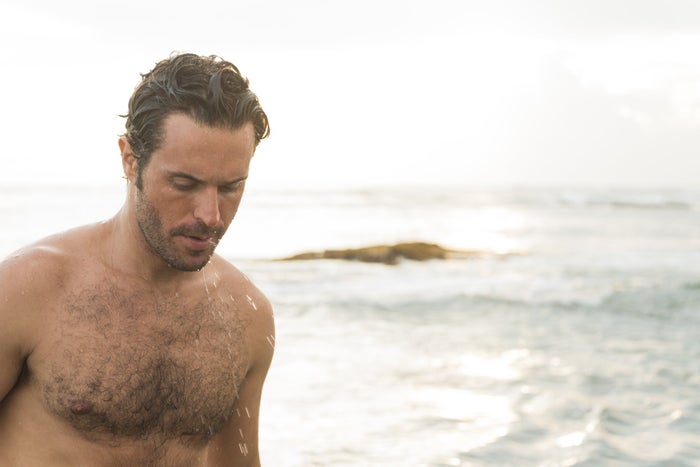
Discover various chest hair styles that can complement your physique and personal style. Experiment with different lengths, patterns, and designs to find the style that suits you best. Some popular chest hair styles include:
1. The Top Heavy Look:
Shave the stomach area while keeping the chest hair thicker for a defined look. This style highlights sculpted abs and creates a visual contrast.
2. The Even All Over Look:
Trim the chest hair to a consistent length for a neat and groomed appearance. This style is versatile and suits various body types.
3. The Natural Look:
Embrace your natural chest hair growth and simply trim it to keep it neat and well-maintained. This style allows for a more relaxed and effortless appearance.
Remember to maintain your chosen chest hair style regularly by shaving or trimming as needed. Experiment with different styles to find the one that makes you feel confident and comfortable.
How often should I shave or trim my chest hair?
The frequency of shaving or trimming your chest hair depends on your personal preference and the rate of hair growth. Some individuals may prefer to do it weekly, while others may find it necessary to do it every few days. Find a schedule that works best for you and suits your desired level of grooming.
How can I prevent irritation and ingrown hairs when shaving my chest?
To minimize irritation and prevent ingrown hairs when shaving your chest, follow these tips:
Exfoliate the chest area before shaving to remove dead skin cells and reduce the chances of ingrown hairs.
Use a sharp razor with multiple blades to achieve a close shave with fewer passes.
Shave in the direction of hair growth to minimize irritation.
Apply a moisturizing shaving gel or foam to create a smooth surface and reduce friction.
Rinse the razor frequently to remove hair and shaving gel build-up.
After shaving, rinse your chest with cool water to soothe the skin and close the pores, then apply a moisturizer or aftershave balm.
Can I use the same razor for shaving my face and chest?
It is generally recommended to use separate razors for your face and body to maintain hygiene and prevent the transfer of bacteria. Using a dedicated body razor for your chest ensures optimal results and reduces the risk of irritation or infections that may occur from using the same razor on different areas of the body.
How can I manage chest hair if I have sensitive skin?
If you have sensitive skin, it's important to take extra care when shaving or trimming your chest hair. Consider the following tips:
Use a razor or trimmer specifically designed for sensitive skin.
Use a moisturizing shaving gel or foam that is suitable for sensitive skin.
Shave or trim with light pressure and avoid going over the same area multiple times.
After shaving, rinse your chest with cool water and apply a gentle moisturizer or aftershave balm.
Should I shave my chest hair if it is coarse or curly?

Shaving coarse or curly chest hair can be more challenging, as it may increase the risk of ingrown hairs and irritation. If you prefer a clean-shaven look, consider using a trimmer to maintain a shorter length rather than shaving it completely. This can help minimize the chances of ingrown hairs while still achieving a groomed appearance.
Why do some guys have no chest hair?
Just as facial hair thickness varies a lot between different men, chest hair growth patterns are unique to each guy. The main factors that affect this are levels of hormones including testosterone along with your genetic makeup and nutrition.
If you have low levels of hair growth in certain areas, you may want to consider whether your diet is rich in proteins and nutrients like keratin.
How do you remove male chest hair naturally?
If you don’t wish to opt for newer technologies such as laser hair removal or electrolysis, manual methods of removal such as shaving, or trimming are one of the simplest to remove chest hair.
Waxing and tweezing are also possible but can be more painful and tweezing may be time consuming for an area as large as your chest.
When does chest hair stop growing?
Chest hair growth will normally start during puberty and can keep growing into your twenties. Similar to hormone levels and genetics affecting hair thickness, both factors also mean some men will have fully developed by the end of puberty, but others can see continued growth until a later age.
How long does chest hair take to grow back?
If you’ve recently trimmed or waxed body hair you might be wondering how long it’ll take for it to grow back in fully. Well, everyone’s hair growth is unique and hormones, age and across your body hair can come back in at different speeds. Try out chest grooming for yourself to see for yourself!
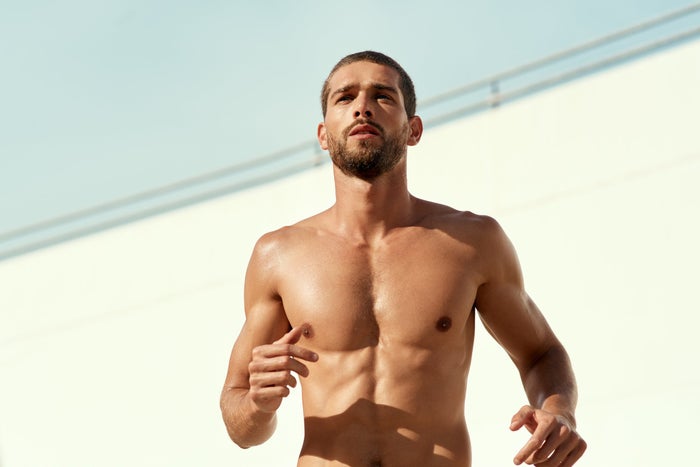
Remember, individual experiences may vary, so it's essential to find a routine and technique that works best for you. Experiment with different methods and products to determine what suits your skin and preferences.
Shaving and trimming your chest hair is a personal choice that allows you to achieve a well-groomed and confident look. With Gillette's expert guidance, step-by-step techniques, product recommendations, grooming tips, and chest hair style suggestions, you can easily navigate the process and achieve the perfect chest hair style for you. Remember to follow proper techniques, choose the right tools, prioritize post-shave care, and experiment with different styles to find your signature look.


